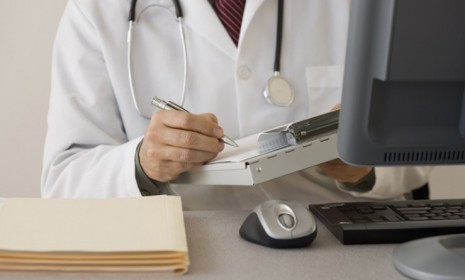Should patients be allowed to see the notes doctors take?
The vast majority of patients want to read their physicians' scribbled observations. Doctors worry that patients will get upset over what they read

A free daily email with the biggest news stories of the day – and the best features from TheWeek.com
You are now subscribed
Your newsletter sign-up was successful
A new study called the Open Notes Project found that more than 90 percent of patients would like to see the notes their doctors write about them during appointments. Most of the more than 38,000 people surveyed in Boston, Seattle, and rural Pennsylvania said they would use that information to take greater control over their health, or as a reminder to take prescribed medication. Some — 22 percent — said they would discuss the notes with other people, including doctors, to make sure they're getting the best care. But most of the 254 doctors questioned for the study, which was published in the Annals of Internal Medicine, said opening their notebooks would just worry patients unnecessarily. Should you be able to read your doctor's notes?
This is a bad idea: This would force doctors to explain or defend themselves if a patient bristles at being described as "'depressed' or 'obese' or 'alcohol dependent' or 'drug dependent,'" Dr. Suzanne Salamon tells the Harvard Health Letter. Openness is important, but doctors should be able to use their notes for "uncertainties, subtle observations, and speculations... without having to worry about needlessly upsetting patients."
"Do you want to see your doctor’s medical notes?"
The Week
Escape your echo chamber. Get the facts behind the news, plus analysis from multiple perspectives.

Sign up for The Week's Free Newsletters
From our morning news briefing to a weekly Good News Newsletter, get the best of The Week delivered directly to your inbox.
From our morning news briefing to a weekly Good News Newsletter, get the best of The Week delivered directly to your inbox.
Transparency is nothing to fear: Some hospitals already give patients access to their records, even doctor notes, Dr. Kenneth Shine, an executive at the University of Texas System, says in the Annals of Internal Medicine. There has been no subsequent jump in malpractice lawsuits, and no flood of needless questions. Technology can be a "powerful tool" — giving patients access to electronic records can boost transparency, "decrease redundant testing, and enhance our care delivery in ways we have yet to imagine."
"Access to the medical record for patients and involved providers"
It all depends on the patient: Even doctors opposed to opening their notes generally acknowledge that this could improve communication with their patients, says Cheryl Alkon at USA Today. And obviously, providing open access to doctors' notes would give patients more information. "But will patients actually use such insights?" The extra information won't result in better care — which is, after all, the ultimate goal — unless patients use it wisely.
"Will reading your doctor's notes lead to better health?"
A free daily email with the biggest news stories of the day – and the best features from TheWeek.com


